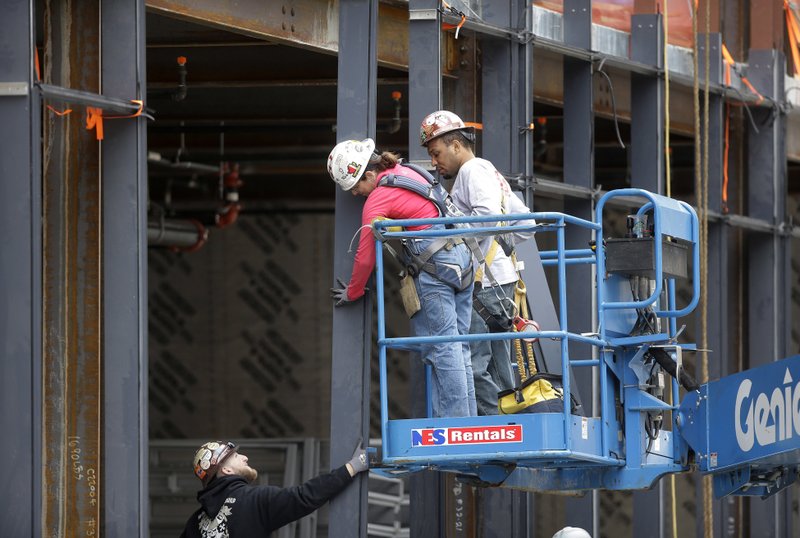WASHINGTON -- America's job market stirred to life in June as payroll growth accelerated by the most since October after a two-month lull, easing fears of broader cutbacks by companies.
Payrolls climbed by 287,000 last month, the Labor Department said Friday.
The unemployment rate rose to 4.9 percent in June from 4.7 percent in May. But that occurred mainly for an encouraging reason: More Americans sought jobs -- a sign of growing confidence -- though most didn't immediately find work. The government counts people as unemployed only if they're looking for a job.
May's scant job gain of 11,000 and April's modest 144,000 increase had raised fears that the job market was weakening after months of solid growth. The United Kingdom's vote to leave the European Union also fanned wider concerns that the American economy was in danger of stalling. During its meeting last month, the Federal Reserve unanimously decided to postpone increasing the benchmark interest rate.
"If you take the last three months and smooth these numbers out -- which is really what you should do -- employment conditions are improving," said Hugh Johnson, chairman at Hugh Johnson Advisors LLC in Albany, N.Y.
The June hiring figures were calculated before the United Kingdom vote. But the robust job growth served as a reminder that through much of the U.S. economy's seven-year recovery from the recession, it has repeatedly withstood crises and recessions overseas.
"We still rank among the best among the industrial economies," said Patrick Newport, an economist at IHS Global Insight. "We're about the only ones doing OK right now."
Investors registered their relief Friday by sending stock prices soaring. The Dow Jones industrial average rose 250.86 points, or 1.4 percent, to 18,146.74. The Standard & Poor's 500 index rose 32 points, or 1.5 percent, to 2,129.90.
"This report should ease any fears that a persistent slowdown or recession is coming soon in the U.S.," said Dean Maki, chief economist at Point72 Asset Management.
The economy had expanded at just a 1.1 percent annual pace in the first three months of the year. But rising consumer spending, a recovering housing market and further strong job gains could accelerate growth in the coming months.
Friday's report painted a broadly encouraging picture. The number of part-time workers who would prefer full-time jobs fell sharply. And hiring occurred in both higher- and lower-paying sectors. Manufacturers added 14,000 jobs, the most since January. Professional and business services, a category that includes accountants, engineers and architects as well as temporary workers, gained 38,000. Retailers added nearly 30,000, health care more than 58,000.
The improved figures probably aren't enough to significantly revise the Fed's outlook. During their June meeting, Fed officials had cited weak hiring as a reason for postponing a resumption of interest rate increases.
That signaled a shift from their April meeting, when many policymakers indicated they were prepared to raise rates if the job market and the economy continued to improve.
In December, the Fed modestly raised the short-term rate it controls after pinning it near zero for seven years. Most economists expect the Fed to remain cautious as it gauges the impact of the U.K. vote and to delay the next increase, perhaps until December or later.
Still, the U.S. economy is much less dependent on exports than many developed countries and therefore less exposed to slowdowns in the EU.
Ethan Harris, an economist at Bank of America Merrill Lynch, said that even a recession in the U.K. would likely have a "tiny" impact on the U.S. economy.
"The spillovers from Brexit are pretty small," Harris said, referring to the vote to leave the EU. "The U.S. economy kind of just plods its way through one [crisis] after another."
With the unemployment rate below 5 percent and hiring solid, average hourly pay is creeping higher. It rose 2.6 percent in June from 12 months earlier. That's above the 2 percent pace that persisted for most of the recovery but still a percentage point below the historical trend in a healthy economy.
Brett Schulman, chief executive officer of Cava Grill, an 18-restaurant chain mostly in Maryland, Virginia and California, said his company raised its starting wage to $13 an hour this week, partly to keep and attract workers. Those making more than that will also receive raises. The move will increase pay for 620 of its 680 employees.
Some of the company's cooks have been drawn away by other restaurants offering higher pay, Schulman said. By offering higher wages and better benefits, Cava Grill hopes to limit future departures.
Brian Krenke, president of furniture manufacturer KI, said his firm has had to raise pay 5 percent to 10 percent for hard-to-fill positions such as tool-and-die technicians. Five of its eight North American factories are in Wisconsin, Krenke said, where the unemployment rate is just 4.2 percent.
"You can imagine how difficult it is to try to identify talented workers and bring them in," he said.
Bill Spriggs, chief economist at the AFL-CIO, said things remain tough for working-class Americans. He noted the flat hiring last month in construction and durable manufacturing such as machinery-making, two relatively well-paying areas that in decades past had provided more opportunities for lesser-educated workers. Construction continues to be held back by weakness in young people going out on their own, he said, while manufacturing faces head winds from a slowing global economy, with new threats now coming after Britain's vote to quit the EU.
Friday's jobs report is "reassuring, but it's not like we're going gangbusters," he said. "It puts us back on a path of moderate growth."
Information for this article was contributed by Victoria Stilwell and Chris Middleton of Bloomberg News; by Christopher S. Rugaber of The Associated Press; by Don Lee of the Los Angeles Times; and by Patricia Cohen of The New York Times.
Business on 07/09/2016
